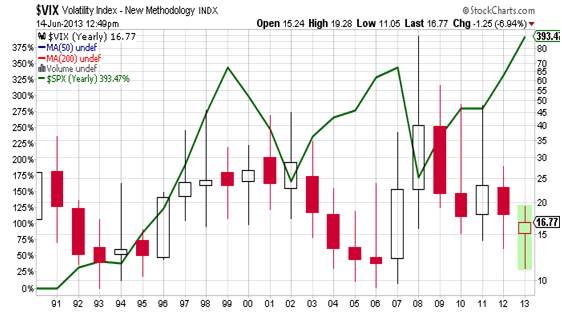One Simple Measure for Investing in a Volatile Stock Market
Stock-Markets / Stock Markets 2013 Jun 18, 2013 - 04:35 PM GMT George Leong writes: Volatility has been edging higher since the end of 2012, but so far, the stock market has held up pretty well.
George Leong writes: Volatility has been edging higher since the end of 2012, but so far, the stock market has held up pretty well.
Take a look at the chart below of the CBOE Volatility Index (VIX), also known as the “Fear Factor Index,” based on the S&P 500 Index. The VIX reading is holding around 16.8—well below some of its high readings since 1990, as shown on the chart. When the VIX is low, it suggests traders are relaxed and not concerned about the current stock market climate; but you need to remain alert, because investor mistakes occur when people are too confident.

Chart courtesy of www.StockCharts.com
The chart shows the inverse relationship between the VIX, shown by the red candlesticks, and the S&P 500, reflected by the green line, since 2002.
At this point, there are some indications on the chart that a near-term top could be surfacing in the stock market, so you will need to be alert to this. Even just the rapid rise in stocks this year should give you a sense of concern, as gains in the stock market are clearly unsustainable.
Moreover, the individual risk of stocks versus the S&P 500, also known as the beta, should be monitored. When the stock market rises, stocks that are associated with high betas generally will move up faster than lower-beta stocks. This is the reason why the Russell 2000 Index, which tends to have a higher average beta than the S&P 500, is leading the pack.
Higher-beta stocks are generally technology stocks. What this means for you is that if the stock market pauses, the higher-beta stocks will be hardest hit, so you should take a look at your holdings—specifically the beta of the stocks in your portfolio. Stocks with higher betas include Cisco Systems, Inc. (NASDAQ/CSCO), Seagate Technology Public Limited Company (NASDAQ/STX), Advanced Micro Devices, Inc. (NYSE/AMD), and NVIDIA Corporation (NASDAQ/NVDA).
As a risk-management strategy, you might want to begin to take some profits off a few of your higher-beta stocks, especially if the stock market begins to move lower.
Lower-beta stocks react less to market moves. If the S&P 500 surges, low-beta stocks will have a tendency to rise, but the rise will not be at the same rate of the S&P 500, which means you will make less money with the lower-beta stocks. Examples of lower-beta stocks are The Procter & Gamble Company (NYSE/PG), Johnson & Johnson (NYSE/JNJ), The Coca-Cola Company (NYSE/KO), and Wal-Mart Stores, Inc. (NYSE/WMT). The positive with lower-beta stocks is that during a market downturn, these stocks will have a tendency to react less than higher-beta stocks, which means that they will likely move down less than the S&P 500.
Source:http://www.investmentcontrarians.com/stock-market/on...
By George Leong, BA, B. Comm.
www.investmentcontrarians.com
Investment Contrarians is our daily financial e-letter dedicated to helping investors make money by going against the “herd mentality.”
George Leong, B. Comm. is a Senior Editor at Lombardi Financial, and has been involved in analyzing the stock markets for two decades where he employs both fundamental and technical analysis. His overall market timing and trading knowledge is extensive in the areas of small-cap research and option trading. George is the editor of several of Lombardi’s popular financial newsletters, including The China Letter, Special Situations, and Obscene Profits, among others. He has written technical and fundamental columns for numerous stock market news web sites, and he is the author of Quick Wealth Options Strategy and Mastering 7 Proven Options Strategies. Prior to starting with Lombardi Financial, George was employed as a financial analyst with Globe Information Services. See George Leong Article Archives
Copyright © 2013 Investment Contrarians- All Rights Reserved Disclaimer: The above is a matter of opinion provided for general information purposes only and is not intended as investment advice. Information and analysis above are derived from sources and utilising methods believed to be reliable, but we cannot accept responsibility for any losses you may incur as a result of this analysis. Individuals should consult with their personal financial advisors.
Investment Contrarians Archive |
© 2005-2022 http://www.MarketOracle.co.uk - The Market Oracle is a FREE Daily Financial Markets Analysis & Forecasting online publication.



